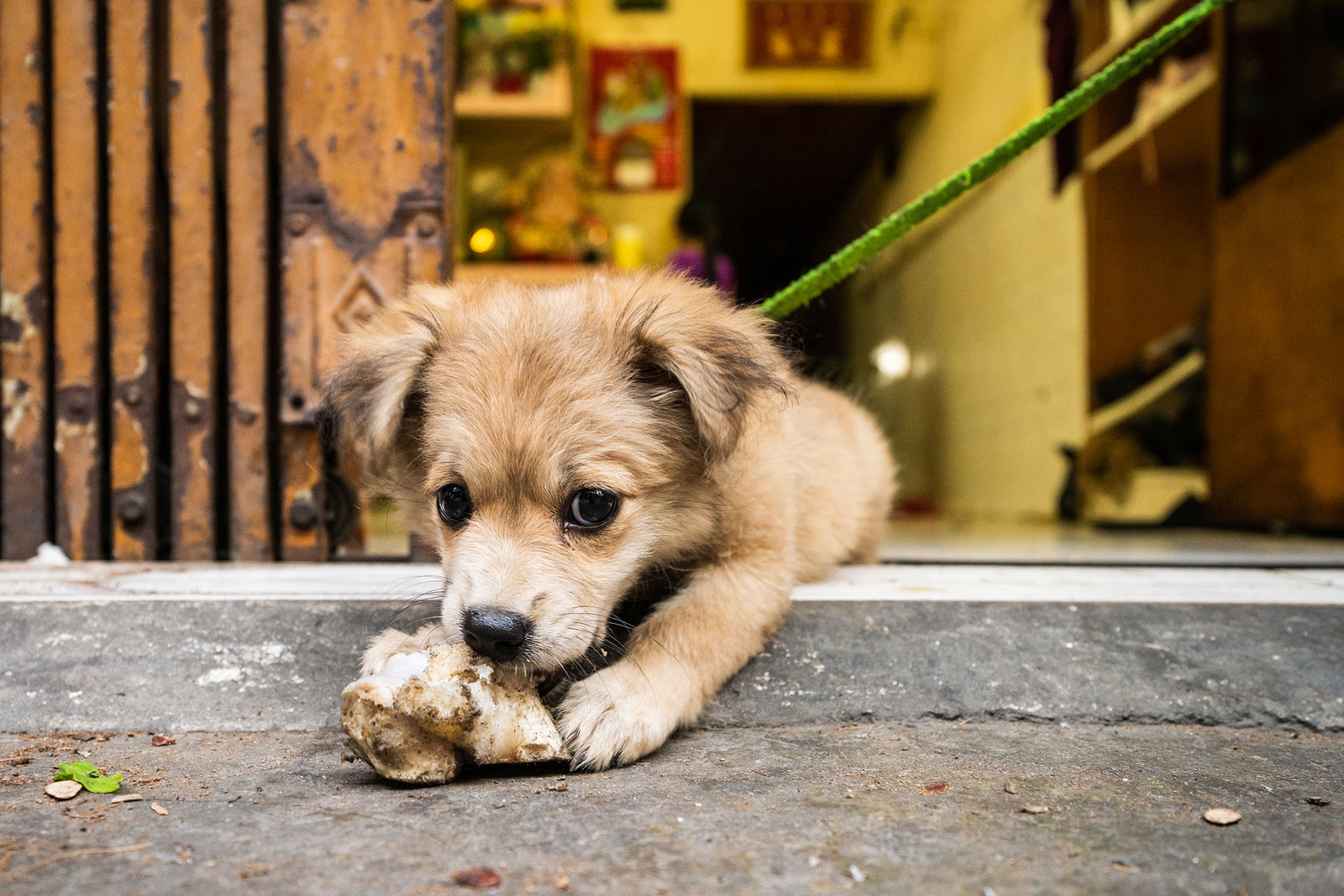About two hours after her morning walk in the Lang Bao Chi area of Thao Dien one recent Sunday, Nguyễn Hoàng Thanh Cao’s two-year-old beagle, Peanut, began vomiting and convulsing uncontrollably.
Cao, still in her pajamas, and her husband Olivier Tognetti, rushed to Saigon Pet Clinic hoping for the best, but fearing the worst. A friend’s dog had just died after consuming poison on the street in the same area. “We knew that she consumed the poison but not that much,” said Cao. “So we had very high hopes that she would make it.”
But, by that afternoon, the couple’s beloved beagle was dead.
Peanut is one of at least four animals — three dogs and one cat — that have died in recent weeks after ingesting a toxin that local veterinarians say was placed on the street to target dogs. The recent spate of poisonings, which comes four years after at least 16 dogs in the same area died by poisoning, has shaken dog owners and inspired thousands to sign a petition calling on authorities to act.
A four-legged family member
Cao and Tognetti first met Peanut in 2019 when she was delivered to their doorstep at two in the morning. “We were sleeping and then we heard, ‘ding dong,’” Cao said. “I didn’t know what was going on.” The two-month-old puppy was a surprise gift for Cao that Tognetti had adopted from a rescue organization in Hanoi. The couple tried out multiple names for the dog, but Peanut stuck, Cao said.

Peanut. Photo by Nguyễn Hoàng Thanh Cao.
Over the next two years, Peanut stole the hearts of Cao and Tognetti’s friends and neighbors and even helped change the minds of Cao’s parents. “When I first got Peanut, they thought Peanut was dirty,” she said. “They didn’t want Peanut to jump on the sofa. They didn’t want to pet Peanut.” In time, though, Cao said her mother began treating the beagle like another member of the family.
After rushing Peanut to the vet, Cao, who had recently lost her father and her aunt, prayed that she wouldn’t lose her four-legged family member, too. But after hours of fighting, Peanut’s veterinarian, Dr. Nguyễn Văn Nghĩa, couldn’t save her.
“When she came, she was just shaking, [had] a lot of saliva, and she couldn’t control her muscle spasms,” said Dr. Nghia, who could tell immediately by her symptoms that she had been poisoned. After Peanut died, he was heartbroken. “I couldn’t sleep that night. I couldn’t talk to anyone,” the veterinarian said. “I had to stop working for nearly one day after that because I felt very bad.”
The poison, he said, is a highly toxic substance called strychnine, which is commonly used as a pesticide. It is sometimes placed on the street in packages shaped like bones or wrapped up with food to kill dogs or stun them so that they can be captured and used for meat, he said. “My job is to help animals, to help the community,” he said. “It’s so hard for me to see animals suffer.”
Animal welfare in Vietnam
Ali Nakhila, who has owned a dog-walking business in Thao Dien for five years, said he and his team of walkers are always vigilant about the threat of poisoning. But the most recent round of deaths has hit particularly close to home. He knew Peanut since she was a puppy and was close with another canine poisoning victim, Noi, a rescued mixed-breed from Bali who died the same week.

Noi. Photo provided by owner.
Nakhila said he believes the people who lay out poison don’t like dogs in their neighborhood and may seek to target animals they consider to be wild, feral or nuisances.
“In my opinion, it’s just lack of communication,” he said. “Some people are not animal-friendly. They don’t understand dogs. Dogs are the most innocent things I have ever encountered in my life,” he said. “Dogs are very honest, very reliable, and they do their best to make you happy.”
A lack of animal rights protections under Vietnamese law means local authorities often don’t see issues of animal deaths or abuse as priorities, said Elizabeth Homfray of Laws for Paws Vietnam, a local animal welfare advocacy organization. A law was passed in 2019 to outlaw torturing animals before they are killed, but Homfray called it “woefully inadequate” and said it is rarely enforced.
“I feel they are just thinking, ‘It’s animals so who cares,’” she said. Meanwhile, earlier this year a new regulation came into effect that levies fines of up to VND3 million on people who abuse pets or farm animals, though it is not clear how well this has been enforced. Humans can also fall victim to poison left on the streets. In April, a child in the Central Highlands died after consuming toxin from a package resembling a lollipop.
“With regard to the poisonings, it’s very disappointing to be in the same situation in the same area,” Homfray said, referring to the 2018 poisonings that occurred in the Lang Bao Chi neighborhood. “It’s frustrating because you can’t help but think, if they had done something the first time this happened, we wouldn’t be going through this again.”
World Animal Protection, an international organization that assesses the treatment of animals in countries around the world and lobbies their governments for policy changes, wrote in a 2020 report on Vietnam that “While animal welfare legislation has increased in Vietnam in recent years, it has limited application to prevent animal cruelty and suffering. Language specifying how animals are to be treated is vague and there is a lack of enforcement mechanisms.”
Cao said she felt like local police didn’t take her seriously when she told them what happened to Peanut. “When I went to report this case, they didn’t even note my name down,” she said. Later on, she said, an officer came to her address to follow-up, but he told her that there wasn’t much the police could do. After Peanut died, Cao said she went to talk to some locals living in the area who told her that pet poisonings are a regular occurrence on their street. “They feel like, ‘Oh this is normal. It happens every two or three months,” she said. “Since when do we accept this kind of behavior?”
Dr. Nghĩa said he occasionally treats dogs that have been poisoned. Just six months ago, he treated a dog who died after consuming a toxic substance in the Lang Bao Chi area. “I think that there are some bad people there and they don’t like dogs,” he said. “They hate people walking their dogs there and they put [out] the poison for the dogs.”
The poison, which is called mã tiền in Vietnamese, is easy to come by and can be purchased on Lazada for VND150,000 per kilogram, he said. Nghĩa said he wants the government to start taking this issue more seriously. Often when pet owners go to the police, they are ignored, or, like in Cao’s case, they’re told that little can be done.

Examples of the poison used to kill dogs and cats. Photo provided by Dr. Nguyen Van Nghia.
“I don’t feel safe,” he said. “My dog is not safe living here…This makes me very angry, and I feel hopeless.”
Working for Change
Determined to draw attention to the issue, Cao and her husband created an online petition that has collected more than 2,700 signatures. They also wrote a letter to the consulate of France, where Tognetti is from, calling on international groups to pressure local police to act. Animal welfare isn’t a top priority for a government that is still mainly concerned with economic development and the quality of life of its citizens, Cao said. But through education and outreach, she believes the culture can change.
As she sat in her home on a recent evening, surrounded by remnants of Peanut — her shed hair, her toys, her food — Cao said her resolve to speak out was stronger than her sadness.
“This is not an act of despair,” she said. “It’s an act of love because this is what Peanut would want. Peanut would want me to put a stop to this, to not let it happen again to any family, to any of her friends.”
















